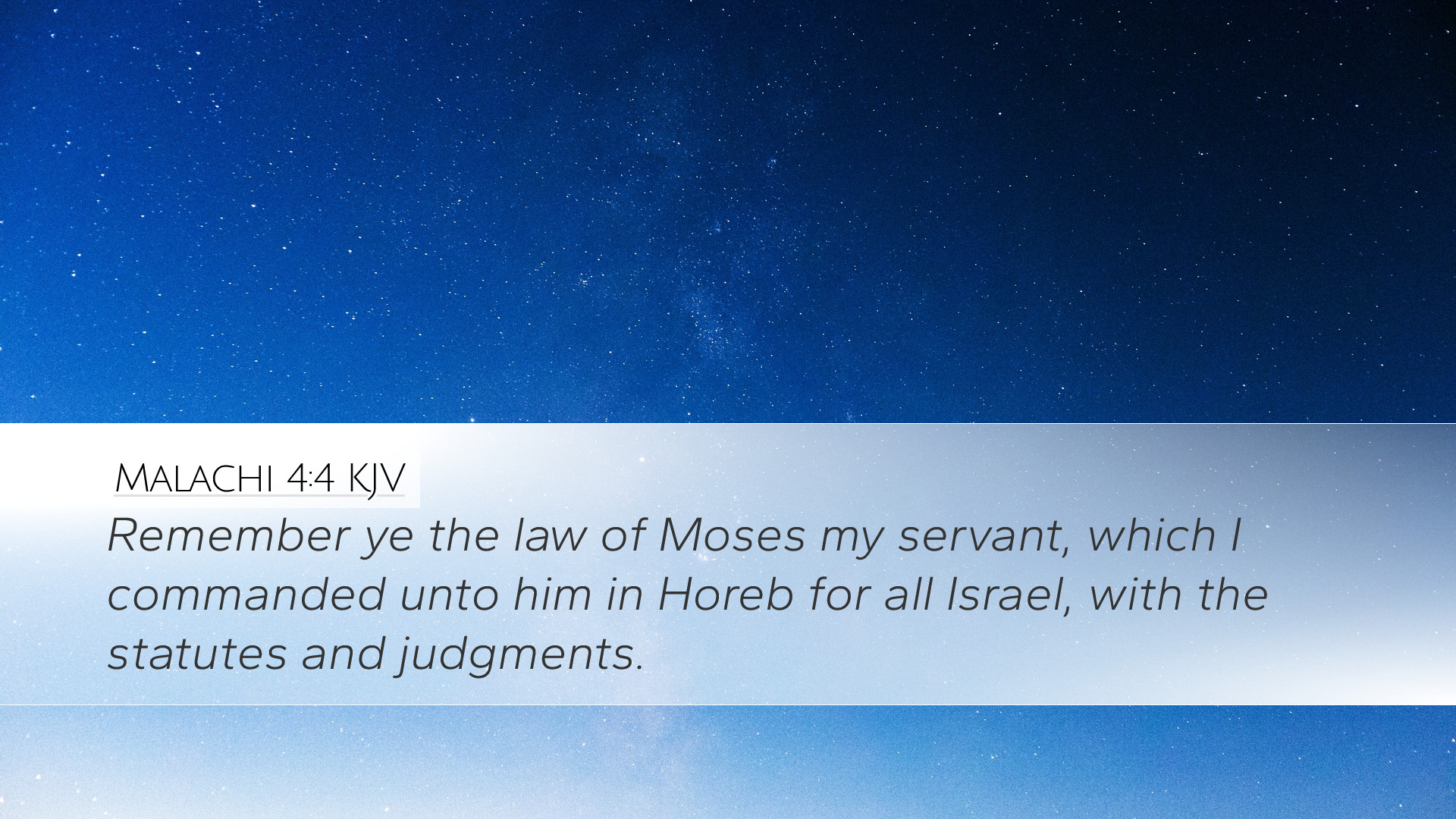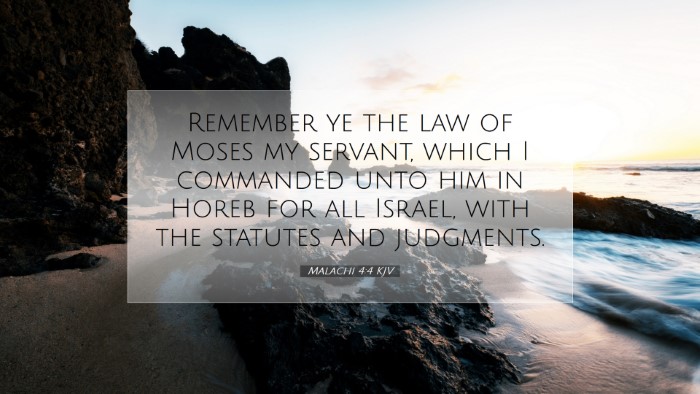Old Testament
Genesis Exodus Leviticus Numbers Deuteronomy Joshua Judges Ruth 1 Samuel 2 Samuel 1 Kings 2 Kings 1 Chronicles 2 Chronicles Ezra Nehemiah Esther Job Psalms Proverbs Ecclesiastes Song of Solomon Isaiah Jeremiah Lamentations Ezekiel Daniel Hosea Joel Amos Obadiah Jonah Micah Nahum Habakkuk Zephaniah Haggai Zechariah MalachiMalachi 4:4
Malachi 4:4 KJV
Remember ye the law of Moses my servant, which I commanded unto him in Horeb for all Israel, with the statutes and judgments.
Malachi 4:4 Bible Commentary
Commentary on Malachi 4:4
Malachi 4:4 states:
"Remember the law of my servant Moses, the statutes and judgments which I commanded him in Horeb for all Israel."
Context and Importance
The book of Malachi serves as a concluding message to the Old Testament, capturing the essence of prophetic teaching. The final verse emphasizes the importance of the Mosaic Law, urging Israel to remember and keep the commandments. As a pivotal transition between the testaments, this verse is rich in theological significance.
Insights from Commentaries
Matthew Henry's Commentary
Matthew Henry stresses the significance of the law in the life of the believer. He notes that God's command to remember His law calls for an active engagement with scripture, implying that neglecting it can lead to spiritual decline. Henry points out:
- Obedience to God's commands: Henry underscores that the observance of the law is paramount for spiritual health and societal order.
- Historical reflection: The recall of the law given to Moses at Horeb serves as a reminder of God's covenant relationship with Israel.
- Spiritual readiness: Believers should remain vigilant, keeping the law in their hearts as preparation for the coming of the Messiah.
Albert Barnes' Notes on the Bible
Albert Barnes offers a critical examination of the law's relevance in Malachi’s context, arguing for its timeless application. He notes:
- Continuity of God's Word: The command to remember signifies that God’s statutes are not to be forgotten despite changing circumstances.
- Restoration through remembrance: Barnes emphasizes that reflecting on the law is essential for national restoration and personal revival.
- Practical obedience: He encourages readers to view the law not merely as historical but as a living guideline for ethical living.
Adam Clarke's Commentary
Adam Clarke provides a comprehensive theological perspective, linking the remembrance of the law to the overall faithfulness of Israel. Clarke points out:
- Prophetic urgency: Clarke emphasizes that Malachi’s exhortation carries a prophetic urgency, as Israel's neglect of the law had led to spiritual desolation.
- The role of the law in grace: He elucidates how the law serves as a tutor leading to Christ, stating that understanding the law is crucial before the revelation of grace in the New Testament.
- Call to obedience: Clarke encourages believers to demonstrate their love for God through their adherence to His statutes.
Theological Implications
The imperative to "remember the law" has significant implications for understanding God's relationship with His covenant people. The law is a reflection of God's holiness and justice, serving as a moral compass for His people.
- God’s Eternal Truth: The law serves as a representation of God's unchanging character, providing believers with guidance through the ages.
- Community and Individual Obedience: The collective responsibility of the community to uphold the commandments emphasizes the communal nature of faith.
- Anticipation of Fulfillment: The call to remember aligns with the expectation of the coming of Elijah referenced in the following verses, illustrating the continuity of God's plan of salvation.
Practical Application for Today
This verse compels modern readers—pastors, students, theologians, and scholars—to engage deeply with the Scriptures. Some practical applications include:
- Engaging with Scripture: Regularly studying and reflecting on the Bible is essential for spiritual growth and understanding God’s will.
- Teaching the Law: Educators in the faith should emphasize the importance of the law in doctrinal teaching and ethical living.
- Fostering Community: Encouraging the church community to uphold God’s commandments strengthens collective faith and accountability.
- Praying for Guidance: Seeking the Holy Spirit's guidance in understanding and applying God's word to everyday life.
Conclusion
The exhortation found in Malachi 4:4 serves as a powerful reminder of the permanence of God's law amid changing cultural landscapes. The insights gleaned from Matthew Henry, Albert Barnes, and Adam Clarke provide a robust framework for understanding this verse, encouraging a holistic approach to Scripture that combines reverence for the past with hope for the future. Active remembrance and observance of God's commandments are not only foundational for personal faith but are also essential for the health and vitality of the broader faith community.


